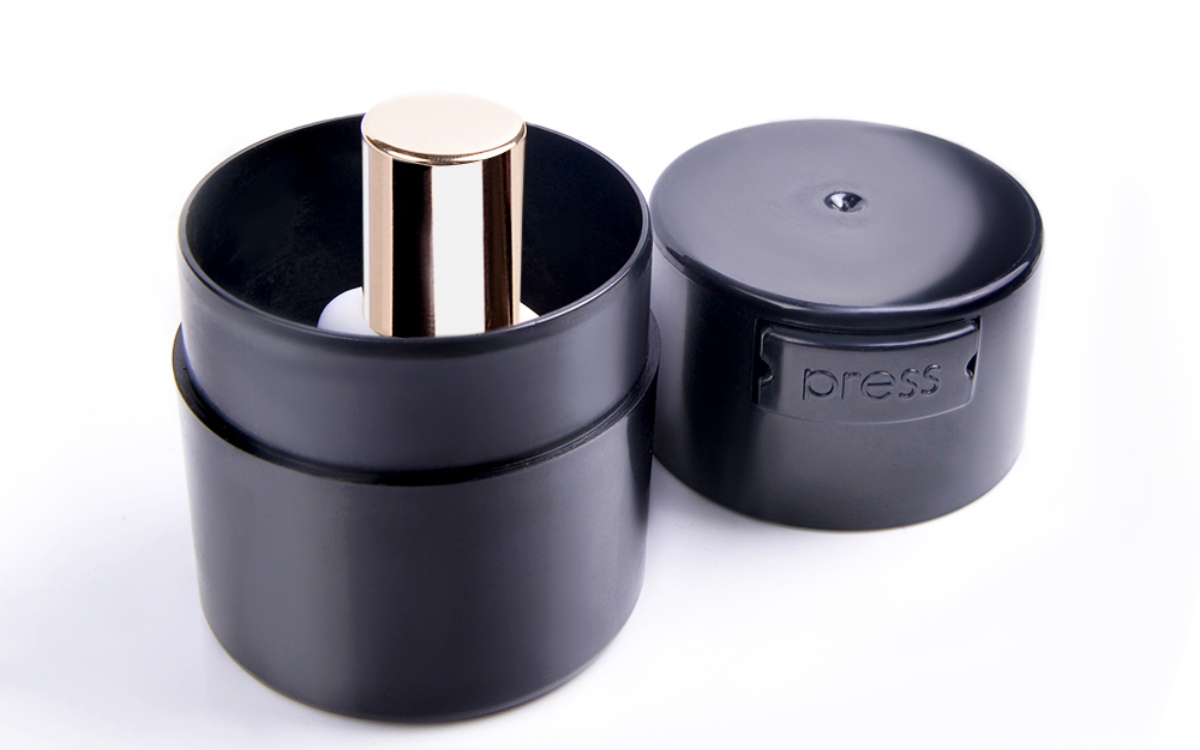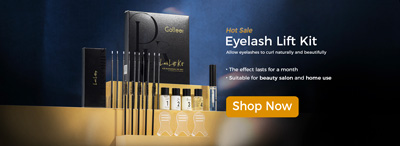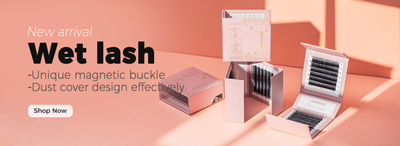Every lash artist knows that a good quality eyelash glue is the secret ingredient to achieving a glam session with a client. Hence, taking good care of your lash glue is crucial to being a lash artist. But eyelash glues have enemies (air and moisture). If you are not particularly careful with the dispensation, usage, and storage of your glue, it can quickly become stringy. Keep reading to learn why lash glues become stringy and how to prevent this phenomenon.
Why Is My Glue Bottle Clogged?
As it turns out, there is more than one reason lash glues become stringy. But before we get to that, have you ever experienced a clogged lash bottle? Do you get frustrated while trying to force the glue out and end up trashing it? We have all been there! Here's why your lash glue bottle is clogged.
When you squeeze out drops of glue, the rest of the glue gets sucked back into the bottle from the nozzle. This is because the glue is subject to a certain resistance. Now, this happens through the funnel-shaped bottle mouth, otherwise called the nozzle.
Naturally, after dispensing the glue, there would be some residual. This residual glue can become sticky or even solidify in a short time, clogging the nozzle. The glue in the bottle will drop down together with the residual glue forming a string. Therefore, always check if there is glue left in the nozzle after every use. If there is any left, squeeze it out and wipe it clean. You can use a lint-free cotton pad for this. Finally, keep the bottle properly sealed after cleaning, and you will avoid the stringy phenomenon.
Why Is My Lash Glue Stringy?
All lash adhesives work best in certain temperatures, humidity, and other factors. Most of the time, as a general rule, it's between 18°C and 24°C and between 40% and 60% relative humidity.
When the temperature is off by as little as 1 degree Celsius, the glue will respond and behave differently and poorly. When the glue gets stringy, it's usually because it's too cold or too hot. When the temperature drops below 18°C, the thickness of the glue changes. This is how and why your lash glue is stringy. So you see, sometimes, the fault isn't with the manufacturer but with storage.

How to Prevent the Stringy Phenomenon
We bet you hate stringiness as much as we do. It can be an absolute nightmare! Especially when you have that hot-shot client in your shop, and the clogged nozzle is causing a delay. As lash technicians, we owe it to our customers to do the right thing per time. And that includes taking tender care of lash glues for the sake of everybody. Here are some tips to prevent the stringy phenomenon of lash glue.
1. Shake the Glue Bottle Before Every Use
Think about a bottle of liquid foundation that you haven't used in a few weeks. You might notice that a thin layer of oil has formed on top of it, and your first instinct would be to shake the bottle before using it.
The same thing happens with lash extension glue. Not only does eyelash extension glue have cyanoacrylate, which helps it stick, but it also has other complex ingredients like stabilizers, thickeners, hardening accelerators, pigments, and so on. Because of this, when it sits in a bottle for a while, the different densities of the different parts will cause the layers to separate.
So, you have to shake the glue to ensure all its parts are mixed well. This is the best way to ensure the glue works well and stays put. Before starting a new set, give the bottle a shake to ensure the glue is at its best. Shake the glue in a horizontal direction at least 30 times.
If you don't always want to do that, you might want to buy an adhesive shaker. Before using your lash adhesive, make it a habit to shake it for at least 2 minutes before starting to apply it.
2. Properly Dispense the Glue
Many of us use jade stones, crystal plates, or glue stickers for our glue droplets as we should. But most of us don't know that we ought not to touch the surface of these things directly. This is because dust may have gotten on the surface of these tools, and this can get sucked into the glue bottle when in contact.
3. Burp the Lash Bottle
Yes, we know this sounds strange, but burping is a real thing. If there is air (oxygen) in the bottle of eyelash glue, it can and will change how fresh the glue is. If you expose adhesive to oxygen, it might not last as long. This is clear when the glue is thick and sticky or when the glue bottle is full. Don't let air into your bottle by burping it every time you use it. After using the glue, give the bottle a gentle squeeze to eliminate these bubbles. This will help eliminate air bubbles, and your adhesive will last longer.
4. Clean the Nozzle After Each Use.
After getting the glue out of the bottle, you must clean the nozzle's tip with a piece of foil or a lint-free cotton pad, just like we said above. If you don't do this, the nozzle could get clogged, or dried glue could get stuck in the cap or on the nozzle.
5. Keep Your Bottles Cool and Dry When You Store it
In general, an adhesive that has been opened has a shelf life of four weeks. However, if the glue is not taken care of properly, it may go bad before then. Even though this may seem obvious, keeping the glue out of the sun is very important. In studios that get a lot of sunlight, the sun can often directly hit the glue. It will help if you put your lash glue away right away in a cool, dark place. Alternatively, keep your glue in an aluminum container that blocks the sun and has silica gel in it when you're not using it.
6. Keep Your Lash Glues Fresh
Once you have opened your glue, it usually stays good for four to six weeks. A bad bottle will have cloudy, too thick glue that is stringy when you dip your eyelashes in it. Keeping track of your stock can be hard, so you might want to sign up for a service that regularly sends you a new bottle of adhesive.
Some services let you choose and change your delivery schedule based on your needs. You can also keep it simple and schedule new deliveries on your calendar. Not only do your glue bottles need to be shaken or changed out often, but the glue drops themselves can also go bad.
You shouldn't use drops if they get stringy when you dip a lash in them. When you're lashing, make sure to switch out your glue drop every 15 to 20 minutes. So, your glue will always be fresh and ready to make the strongest bond.

FAQs
1. What Should I Do if the Glue for My Eyelash Extensions Is Taking Too Long to Dry?
You can speed up the curing process by raising the temperature and humidity.
2. Are There Different Ways to Store Glue Depending on What Kind it Is?
All glues for eyelash extensions are made with cyanoacrylate. So, the method of storage is the same.
3. Can I Keep My Lash Extension Glue in a Refrigerator?
A refrigerator is not a good place to store glue because it can cause condensation on the outside and inside of the bottle, making the glue go bad. The eyelash extension glue hardens when it comes in contact with moisture in the air. Because of this, the best place to store it is in a cool, dark place.
If you have to put the glue in the fridge, seal it as much as possible so that moisture doesn't get in. Take it out of the fridge at least two hours before you want to use it.
4. When Should I Shake My Eyelash Adhesive?
When you open a new glue bottle, you should shake it for two minutes. You should also shake it a little before each drop. Now you have to put your heart into your shake. Your arm should be a little bit sore.
You could also buy a lash adhesive shaker if you don't want to do it. Don't shake your glue with the cap on. Instead, take off the cap, put a pin in the nozzle, or cover the nozzle with a piece of tin foil. Don't forget to let your bottle "burp."
When you use your eyelash glue, air can get into the bottle, and the air brings humidity with it. You can see how this could be a problem if air bubbles get stuck in the nozzle. To get the bubbles out, turn the nozzle of the adhesive bottle right side up after dispensing a drop and gently squeeze until the air bubble comes out of the nozzle.

Conclusion
We hope you enjoyed reading through it. And we do hope you don't panic the next time you experience the stringiness phenomenon. As we said, if you clean the nozzle of your glue bottle well after use, you can avoid having a clogged bottle. Remember that keeping your glue fresh is crucial to your work as a professional lash artist.







